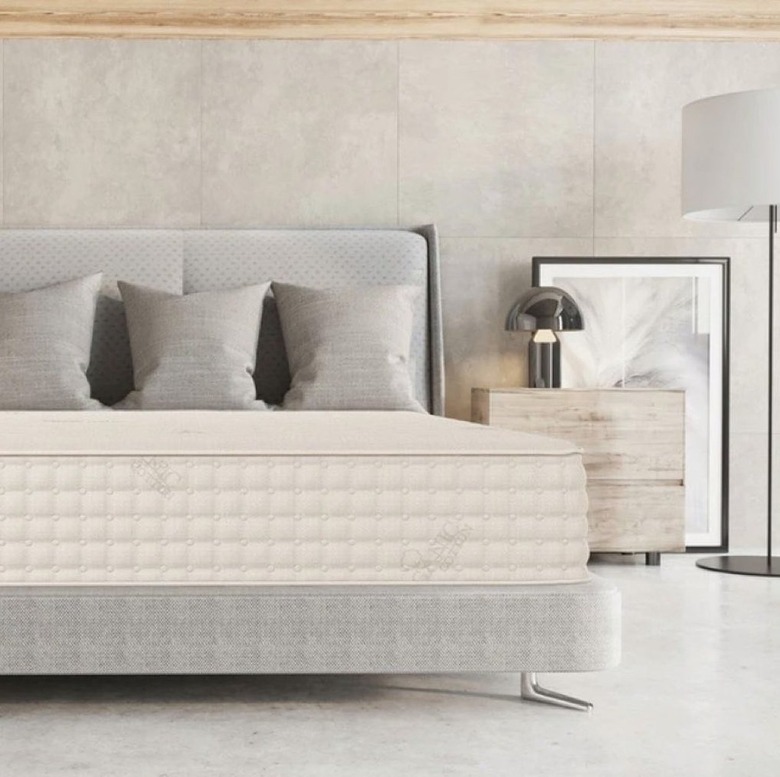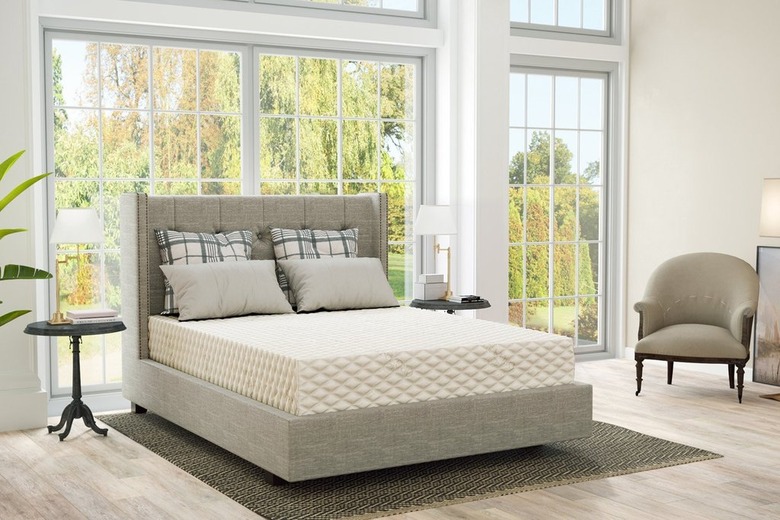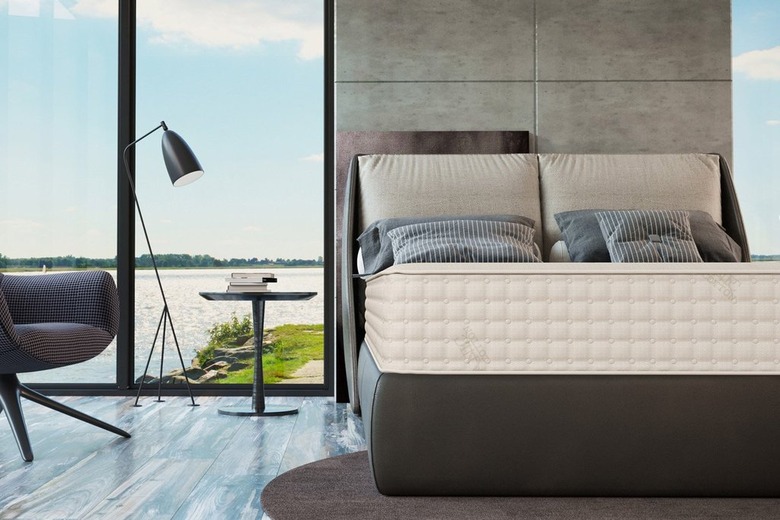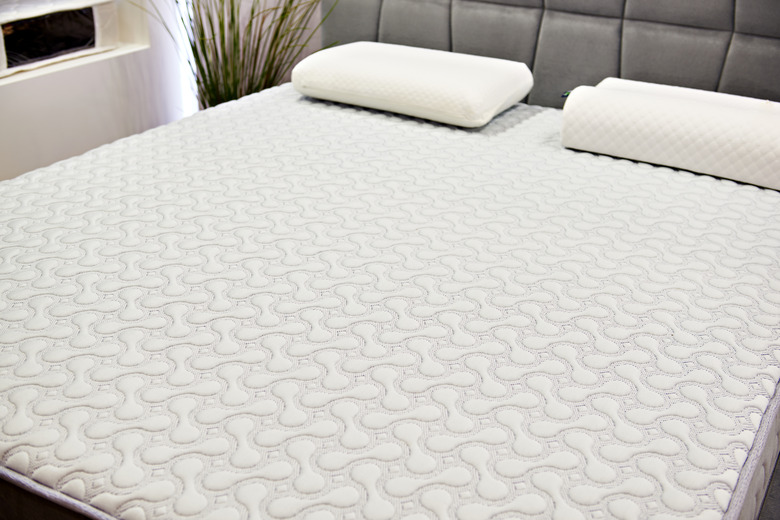Buying A Mattress This Weekend? Read This Shopping Guide First
The past year-and-a-half has changed how we do many things — too many to list — but one of the biggest shifts we've noticed is the move to online shopping for most household items. While ordering groceries and picking out decor online is relatively easy and risk-free, browsing for big-ticket items virtually is another story. One of the hardest items to shop for? Mattresses.
If the idea of going into a store to lay down on a sample mattress doesn't sound very appealing, Michael Hughes, CEO of PlushBeds, has shared all of his genius and insider tips for successfully shopping for a mattress online.
And great news: He told Hunker most mattresses sold online are typically better than store-bought models in terms of composition, durability, and overall quality. So, ditch the store for good and read on for our foolproof guide to shopping for (and buying) a mattress online.
1. Decide which type of mattress you want.
1. Decide which type of mattress you want.
You may think that going into a store to feel every mattress is the only way, but you can very easily narrow down the options with just a little bit of research. Simply knowing the type of material you prefer can go a long way in your mattress search and can help you shop online for your future bed. To make it a bit easier, Hughes helped us break down the four different types of mattresses:
Latex Mattress: Typically made with organic or natural latex foam layers and an organic cotton cover. These offer bounce and a rounded contour to the body and are popular for their luxurious comfort, superior buoyant support, and pressure-relieving benefits. This is also the healthiest mattress choice and can last 20+ years, but they often have a higher price point.
Memory Foam Mattress: Typically made with memory foam and/or polyfoam layers and a polyester and cotton cover. These conform to the body, giving a "sinking in" feeling while you lie in the bed. Hughes cautions, though, that this type of mattress can have its cons. They can often trap heat — so, not great for hot sleepers — and produce odors and off-gassing (the chemical smell on a lot of new products). Amazon offers a great selection of memory foam mattresses.
Hybrid Mattress: Typically made with multiple layers of memory foam, polyfoam, or latex, a pocketed coil support core, and a cotton cover. They can contour to the body similar to a memory foam or latex mattress, but without trapping heat. They also provide great support and last for 10 to 15 years. Check out our review of Brentwood Home's popular hybrid mattress.
Innerspring Mattress: Typically made with a two-inch or less foam top layer, a steel coil support core, and a polyester cover. They offer good edge support, but they don't contour to the body as well as other mattress types and they're prone to sagging.
2. Know what kind of firmness you need.
2. Know what kind of firmness you need.
Each sleeper has unique needs in a mattress. Once you know what type of material you'd like, the next step is using your body weight and sleeping position to help you determine the comfort and support you need from your new mattress. Here is a general guide from Hughes, however, keep in mind that firmness preferences are ultimately subjective, so use your historical preferences as a guide as well.
Body Weight:
Under 130 lbs: Soft to medium.
130 – 230 lbs: Medium to medium-firm.
230+ lbs: Medium-firm to firm.
Sleeping Position:
Side Sleepers: Typically prefer a medium feel and should look for softer mattresses that will offer pressure point relief and cushioned support such as the PlushBeds Cool Bliss.
Back Sleepers: Typically prefer a firmer feel and should choose mattresses that offer optimal support. A medium-firm or firm mattress will provide lumbar support and provide proper spine alignment. Natural latex mattresses, such as the PlushBeds Botanical Bliss, offer great support and cushioning.
Stomach Sleepers: Typically prefer a medium-firm feel and should seek out a mattress that offers pressure point reduction and support such as the Natural Bliss.
3. Consider extra factors.
3. Consider extra factors.
Once you know what your sleeping and comfort preferences dictate, it's equally important to also weigh in all of the extra costs and factors, such as budget, return policy, and warranty.
Budget: While this is likely top-of-mind for most shoppers, the cost of a new mattress will depend on many factors including size, brand, and type. Since a mattress is generally a long-term investment, consider the quality, durability, comfort, support, and warranty of your new mattress, and be sure to choose quality above all else. Getting great sleep and physical support on your body is the best type of investment you can make. And, of course, always keep an eye out for good sales.
Delivery: Pay special attention to delivery and set-up offers. Most online manufacturers and retailers will ship the mattress to your home, free of charge, but you don't want to get stuck with an expectedly high fee just to get your mattress delivered.
Trial Period and returns: Most online manufacturers and retailers these days offer generous trial periods. During this period, you will be able to return the mattress if you are not satisfied and receive a full refund without extra charges. Shopping for a mattress online is tricky — although hopefully easier with this guide! — but knowing that you have the flexibility and can test these products out will give you peace of mind. If you do plan to test out a mattress for fear of not liking it, double-check any return or restock fees so you aren't surprised.
Warranty: A mattress warranty may last anywhere from two to 25 years. There are many warranty-related factors to consider, such as shipping costs and prorated/non-prorated coverage. It's best to review the warranty for your new mattress so you know what to expect and can plan out your budget over the course of your new mattress's full lifetime.
4. Responsibly get rid of your old mattress.
4. Responsibly get rid of your old mattress.
If you've finally pulled the trigger and bought yourself a new mattress — congrats! But, PlushBeds and Hughes recommend recycling your old mattress responsibly. A list of mattress recycling companies, listed by state, within the USA, and in Canada, can be found on the PlushBeds website for easy access. Alternatively, Hughes recommends finding another use for your old mattresses, such as using it in a guest bedroom or donating it to charity or those in need. These are all better options than throwing it in the trash.




